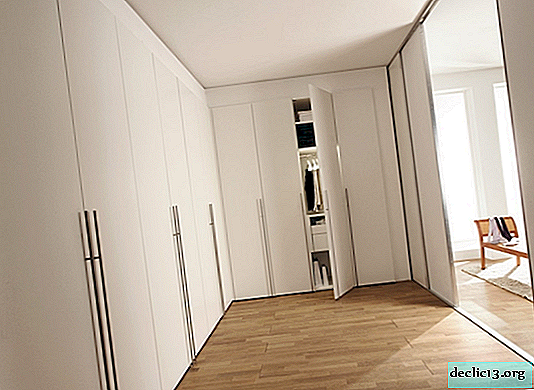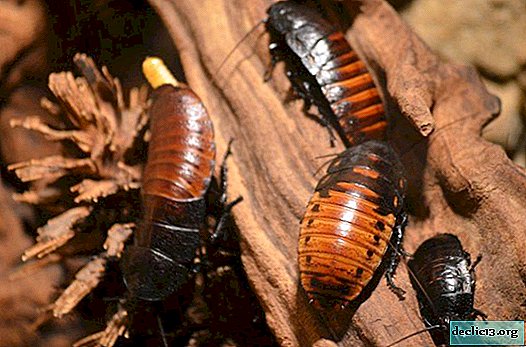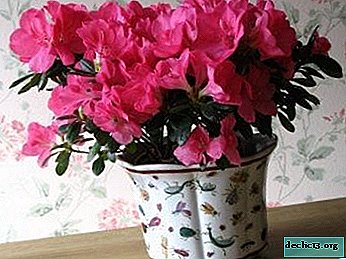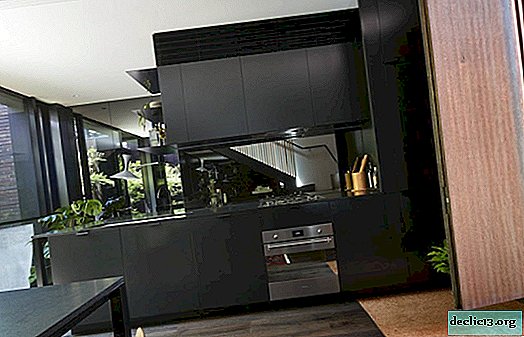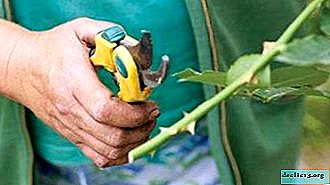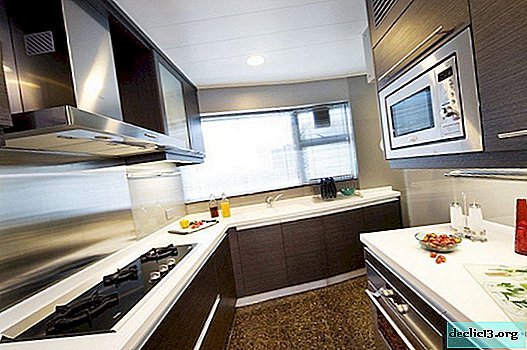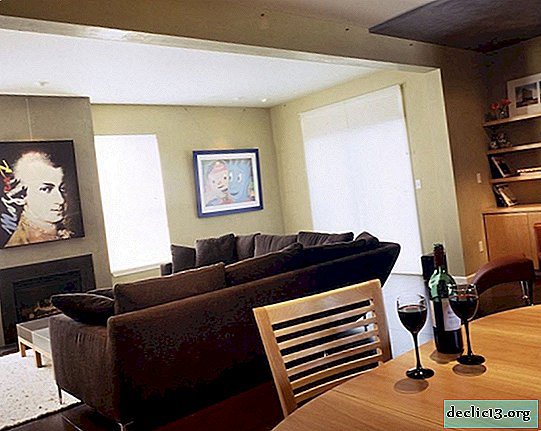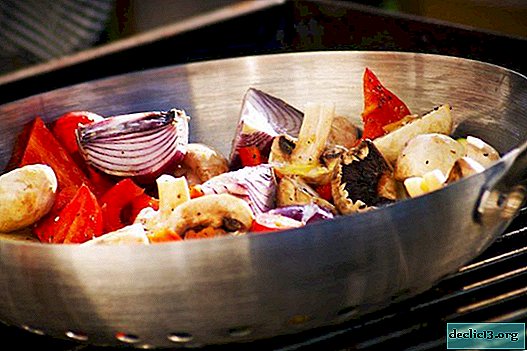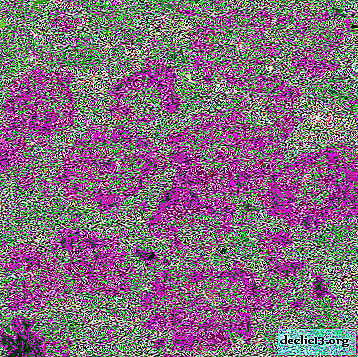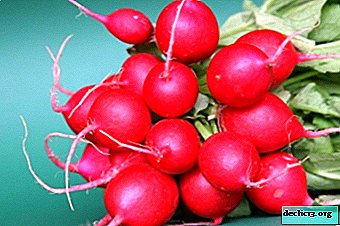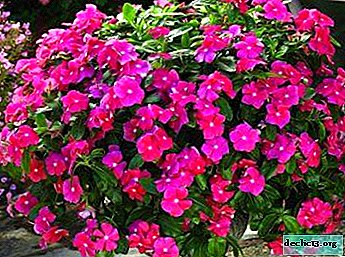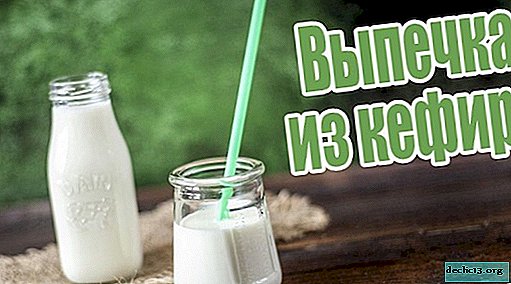Agricultural technology, features and nuances of growing Jerusalem artichoke in open ground in the country, at home and for business
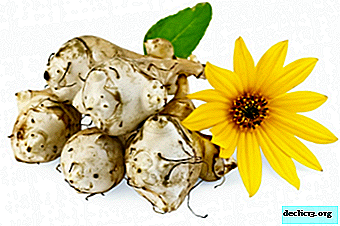
Earthen pear is a perennial plant that affects its unpretentiousness and productivity.
The name "earthen pear" the plant received due to the elongated form of tubers. Tubers contain a unique vitamin and mineral composition.
His homeland was North America, where he is still found in the wild. An earthen pear came to Europe thanks to the traveler Samuel de Champlain at the beginning of the 17th century.
Agrotechnics and cultivation features of an earthen pear
Jerusalem artichoke, or earthen pear, has many advantages over other crops. It is widely used in cooking, landscape design and medicine.
Due to its resistance to external factors, Jerusalem artichoke does not need weeding, top dressing and methods of protection.Moreover, Jerusalem artichoke cultivates the soil and displaces weeds from the beds. It can be grown in the same garden for 30-40 years without harming the soil.
Seed cost
The price of Jerusalem artichoke tubers ranges from 25 to 150 rubles per kilogram. One kilogram contains 10-15 tubers. The spread in price is justified by the time of year, the tuber dispatch area and the quantity ordered.
Step-by-step instruction: how to breed a vegetable in open ground at a site or in a country house?
The following describes how to grow an earthen pear in open ground.
Planting its seeds and tubers
Jerusalem artichoke seeds are planted in the spring in the soil to a depth of 7-8 cmand tubers of earthen pear in the spring to a depth of 6-12 cm or in the winter to 10-12 cm.
Care
 As soon as the first shoots of Jerusalem artichoke appear, you need to clean the aisles from weeds and loosen them. The procedure must be repeated 3-4 times with an interval of 2-3 weeks. An earthen pear must be spudded and fed with urea when the plant reaches 15-25 cm in height. This will ensure Jerusalem artichoke optimal temperature and maximum air circulation, which will positively affect the taste of earthen pears.
As soon as the first shoots of Jerusalem artichoke appear, you need to clean the aisles from weeds and loosen them. The procedure must be repeated 3-4 times with an interval of 2-3 weeks. An earthen pear must be spudded and fed with urea when the plant reaches 15-25 cm in height. This will ensure Jerusalem artichoke optimal temperature and maximum air circulation, which will positively affect the taste of earthen pears.
Watering
Since Jerusalem artichoke is an unpretentious plant, watering should be carried out only in the driest months in the southern regions once every 7-10 days, spending 10-15 liters of water on moistening one bush. An earthen pear does not need watering in temperate regions.
Top dressing
Jerusalem artichoke can grow without fertilizing, but top dressing can almost double the yield of earthen pears. In spring, nitrogen or potash fertilizers should be added to the soil. After the appearance of the first shoots of an earthen pear, you can fertilize the plant with infusion of fermented grass mixed with chicken droppings. In July, it is worth fertilizing the plant with either a solution of seaweed or an infusion of green manure.
Mineral fertilizers should be applied every year, and organic - once every 2 years.Thinning
Jerusalem artichoke has the ability to mutually suppress, which negatively affects the quantity of the crop. It is necessary to thin out the plantations of the earthen pear, avoiding their excessive accumulation. You need to think about this stage of care when the height of the shoots is 10 cm.
An acceptable distance between the rows of Jerusalem artichoke is considered to be 30-35 cm, and between the stands - 45-50 cm.
Protection
When white rot and powdery mildew (white bloom on the stems) appear on the Jerusalem artichoke, the affected plants will have to be burned to avoid throwing the pathology to other plantings.
Pruning
Pruning Jerusalem artichoke bushes in early August has a beneficial effect on productivity. It is necessary to cut Jerusalem artichoke flowers so that all the nutrients go to the development of root crops.
Step-by-step instruction: how to propagate at home?
 To grow an earthen pear at home, you should plant the plant in boxes with drainage or large containers for propagating seeds and tubers.
To grow an earthen pear at home, you should plant the plant in boxes with drainage or large containers for propagating seeds and tubers.
Caring for an earthen pear at home is practically no different from caring for this plant in the open ground.
However Jerusalem artichoke at home should be watered regularly. Watering should be carried out in the morning or evening hours with water at a temperature of 15 degrees.
Growing as a business
In Russia, more and more farmers are thinking about raising Jerusalem artichoke for sale, because earth pear tubers are used as raw materials for the manufacture of dietary and baby food, and high-quality animal feed is made from green mass. The yield of tubers can reach 40-50 t / ha, and the yield of green mass - 30 t / ha.
Given that the average price of Jerusalem artichoke tubers is 87.4 rubles per kilogram, and the average price of green mass is 1075 rubles per ton, it turns out that income per hectare of land planted with Jerusalem artichoke can reach 4 million rubles.
Since Jerusalem artichoke is an unpretentious plant, the cost of its production, as farmers admit, is minimal. The most expensive acquisition will be the T-25 tractor for harvesting worth 500-600 thousand rubles. If we add to the price of a tractor the cost of planting material, fuel and wages for workers, then the amount will be 2250000, which is almost 2 times higher than the profit from 1 hectare planted with Jerusalem artichoke.
Registration of legal entity for business
To register a legal entity in Russia, you will need a certain set of documents, which any law firm in your region can help prepare. However, there is a number of data that an entrepreneur must decide before submitting documents:
- Write down the types of activities carried out by the legal entity from the OKVED directory.
- Choose the appropriate form of ownership - LLC or IP.
- If there are several participants, you need to create a memorandum of association, clarify the amount of money invested, choose a CEO.
- Find a legal address for registration of a legal entity.
Features
Growing an earthen pear, one of the least picky crops, brings considerable profit to the entrepreneur: the cost of growing Jerusalem artichoke is low, high costs are expected only at the very beginning of production, in the following years, the entrepreneur will have to spend money only on depreciating machinery and wages for workers.
Possible errors and ways to fix them
 One of the most common mistakes in the cultivation of Jerusalem artichoke, which leads to a decrease in productivity, is the thickening of the planting of an earthen pear. This problem can be easily solved by thinning out plantings that have already reached a height of 10 cm. If a thick airtight crust has formed on the soil, it must be carefully loosened.
One of the most common mistakes in the cultivation of Jerusalem artichoke, which leads to a decrease in productivity, is the thickening of the planting of an earthen pear. This problem can be easily solved by thinning out plantings that have already reached a height of 10 cm. If a thick airtight crust has formed on the soil, it must be carefully loosened.
Despite the fact that earthen pear - a non-whimsical plant, you need to water it at least once a month, and the productivity of this plant will perfectly increase timely top dressing in early spring and in the second half of summer.
Beginner farmers often make a mistake by cutting off the aerial part of Jerusalem artichoke in the fall. This is a mistake, because the aboveground part should not be cut off until the harvest itself: it contributes to the accumulation of nutrients in the tubers of the plant for the next year.
Diseases and Pests
Jerusalem artichoke is little susceptible to disease and pests. However in a too dry or rainy summer the plant is prone to get sick:
- White rot, which is manifested by felt plaque on the stems. The diseased Jerusalem artichoke bush needs to be burned to prevent the disease of the remaining bushes of the plant.
- Powdery Mildewa symptom of which is also a plaque on the stems. The diseased plant must be burned.
- Alternariosisin which leaves are covered with dark brown spots and dries.
Jerusalem artichoke can harm:
- slugs;
- Bears
- mice
- moles;
- May beetles and their larvae.
A concentrated soap solution or garlic infusion will help to avoid this problem.
Harvesting and storage
When autumn comes, you should dig up only part of Jerusalem artichoke, because earthen pear is a frost-resistant plant that can withstand –40.
With the excavation of an earthen pear you need to wait until the end of October or beginning of November. The earlier you dig Jerusalem artichoke - the less useful substances you will find in it.Despite all its undeniable advantages, the earthen pear has one significant drawback: the fruits quickly deteriorate at room temperature. That is why experienced growers recommend storing Jerusalem artichoke either in a cellar with high humidity, or in small portions in the refrigerator, or in piles.
Burta is a shallow pit where root crops are buried, alternating them with layers of sand, straw or snow.
Jerusalem artichoke is a relatively new word for the layman, but this plant will soon gain attention with its unpretentiousness, frost resistance and productivity. Earthen pear contains nutrients needed for baby and diet.

